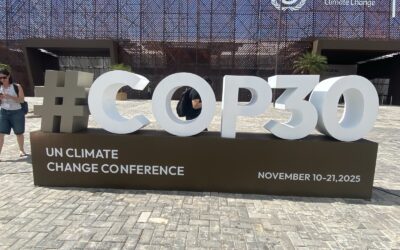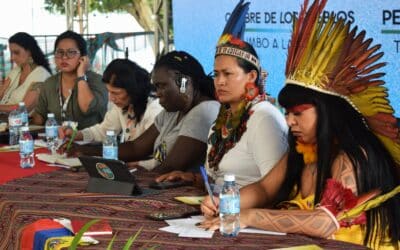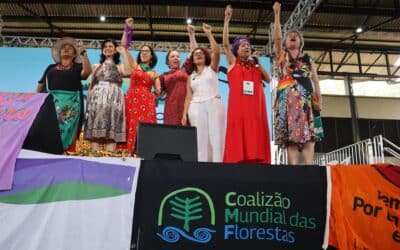18 March: The European Commission’s International Cooperation arm (DEVCO)[1] has launched a 5-year partnership agreement with a coalition of 5 global and regional women’s networks to implement the Sustainable Development Goals (SDGs). The 17 SDGs [2], adopted by the UN in September 2015, are a universal roadmap to achieve a historic pledge to end structural inequalities between countries, between rich and poor and between men and women by 2030.
This partnership results from the European Commission’s commitment to support the implementation of SDG 17 to “Strengthen the means of implementation and revitalize the global partnership for sustainable development” and recognize that “empowered civil society (…) can contribute to more effective policies, equitable and sustainable development (…)[3]”.
The 5 groups signing the agreement are WECF International [4], Women Environmental Programme [5], Global Forest Coalition [6], Gender and Water Alliance [7], and Asia Pacific Forum on Women, Law and Development [8]. Together they represent over 200 organizations in more than 52 countries that will directly engage in the project, as well as a network of over 900 member organizations in over 100 countries. The Framework Agreement is one out of 21 signed with EC Commissioner Mimica at the Europaid CSO Forum on Friday 18th of March in Brussels.
“Despite 50 years of efforts and the significant development of international instruments and mechanisms to advance women’s rights, the human rights situation of women in most countries is at a stand-still or even being rolled back. For instance, fewer than 2 countries have parity in national parliaments [8], women do 75% of unpaid work globally [9], and own less land and assets then men [10]. The SDGs recognize that women’s human rights, dignity and full participation in decision-making is a pre-requisite to achieving sustainable development for all,” said Sascha Gabizon.
“We welcome the fact that the European Commission sees the crucial importance of the women’s rights movement for achieving the SDGs. Many of the most visionary and courageous defenders of human rights and the planet are women. Just last week Berta Caceres and her colleague Nelson Garcia were brutally murdered for defending the rights of indigenous peoples in Honduras, whose lands are threatened by a partly Dutch and Finnish-financed hydro-electric dam,” said Simone Lovera, Global Forest Coalition (11).
“SDGs require our governments to strengthen accountability, realize justice and peace, and end all forms of violence and impunity (Goal 16). Global movements must support a system-change of international trade and investment architectures and the creation of binding human rights regulations for businesses, which are critical to implementation of the SDGs” said Govind Kelkar, Board member of Asia Pacific Forum on Women, Law and Development.
These women’s coalitions have been part of the sustainable development process from the very beginning as part of the Women’s Major Group [9] created by UN Member States in 1992 as a key social constituency for Sustainable Development. “We were key players in the making of the SDGs. We helped ensure that women’s human rights, gender equality and development justice is at the very core of this global discourse. Now we will make sure the SDGs are implemented in accordance with those priorities,” said Priscilla Achakpa
Contact Information:
WECF: Sascha Gabizon, Executive Director, wecf@wecf.eu +49-172-8637586
WEP: Priscilla Achakpa, Executive Director, Priscilla.achakpa@wepnigeria.net +234-9-2910878
GFC: Isis Alvarez, Global Forest Coalition, isis.alvarez@globalforestcoalition.org
GWA: Esther de Jong, Deputy Director, estherdejong@chello.nl +31-313427230
APWLD: Kate Lappin, Regional Coordinator, apwld@apwld.org +66-53-284527
Notes
[1] The European Commission’s Directorate-General for International Cooperation and Development (DG DEVCO) is responsible for designing European international cooperation and development policy and delivering aid throughout the world. Link: https://ec.europa.eu/europeaid/general_en
[2] See all SDG goals, targets and indicators at https://sustainabledevelopment.un.org
[3] https://sustainabledevelopment.un.org/focussdgs.html
[4] WECF is an international network of over 150 women’s and civil society organizations implementing projects in 50 countries and advocating globally to shape a just and sustainable world. Link: http://www.wecf.eu/english/about-wecf/
[5] WEP is an independent and critical civil society organization, known for its grassroots women environmental work in rural areas of Nigeria, which has grown into a pan-African CSO network. WEP has successful experiences with policy analysis and capacity building of women and youth in, environmental, social and economic rights including local authority budget expenditure to increase transparency from a gender perspective. Link: http://www.wepnigeria.net
[6] Global Forest Coalition is a worldwide coalition of almost 80 NGOs and Indigenous peoples’ organizations from 53 different countries striving for rights-based, socially just forest conservation policies. Link: https://globalforestcoalition.org
[7] GWA based in Netherlands and Bangladesh is a global network with 725 organizational members in 129 countries (80% from non OECD countries). GWA is specialized on building capacity of decision makers and water professionals, going from ‘gender blind’ to becoming active supports of gender equality in their institutions and programs. Link: http://genderandwater.org/en
[8] APWLD, based in Chiang Mai, Thailand, is Asia Pacific’s leading feminist membership-driven network, with three decades of experience in training, research, advocacy and movement building for women’s human rights. APWLD’s 195 member organizations represent groups of diverse women from 28 countries in Asia Pacific. Link: http://apwld.org
[9] Women in National Parliaments, Classification Feb. 2016 by Inter-Parliamentary Union http://www.ipu.org/wmn-e/classif.htm
[10] McKinsey 2015 MGI Power of parity Executive Summary September 2015
[11] ‘…Women own 2% of land’ Cheryl Doss Senior Lecturer in African Studies and Economics at Yale University
[11] See also http://www.banktrack.org/show/actionletters/civil_society_response_on_fmo_finnfund_suspension_loans_to_agua_zarca_project
[12] http://www.womenmajorgroup.org




